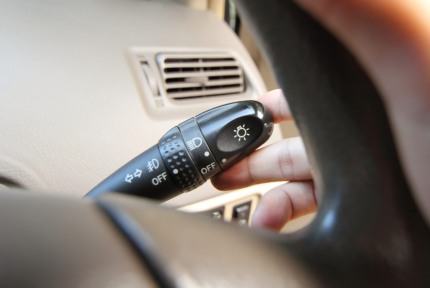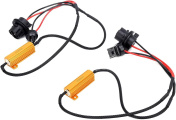
It's easy to understand why turn signals are so important when you think about how they work. A car's turn signal is basically a warning to other drivers that the vehicle is changing lanes or turning. When you see a turn signal blinking rapidly, it means the driver is in a hurry and wants to get through the intersection as quickly as possible.
A fast-blinking turn signal generally means that the bulb for that particular side is burned out. However, there are some more reasons for this issue. Let`s take a closer look at them.
How Does It Work?
Actually, before we start to troubleshoot, it's important to understand the process of how a turn signal operates. The electric current that flows through the wiring harness in your vehicle controls all external lights, including the turn signals. When you activate the turn signal lever, it sends a pulse of electric current from the battery to an electronic flasher unit. This component determines how fast or slows the bulbs blink, based on its internal timer setting.

The flasher module uses resistance to help power turn signal bulbs. When a filament in the bulb breaks, it causes the module's operation to speed up and makes the other bulbs flash faster. While a fast-blinking turn signal is an annoyance, it's still better than having no warning at all!
As you can see, it works in such a way that a broken filament can cause the bulbs to blink faster. It's possible that there may be an issue with either your wiring or the turn signal assembly itself. So, if you notice that your turn signals are blinking abnormally fast, it's best to have a professional take a look at it and diagnose the problem.
It's important to address this issue right away so that other drivers can see when you're changing lanes or turning, which will ensure everyone's safety on the road!
Why Is My Turn Signal Blinks Fast But All Lights Work?
It's common for turn signal bulbs to burn out, but if all lights are working, then the issue is likely a damaged or worn-out flasher unit. The flasher unit controls the speed of the blinking and when it malfunctions, it can cause your turn signals to blink rapidly.
It happens because the flasher unit's internal timer is not set to the correct speed. This can be caused by a faulty component, or it could be due to age-related wear and tear. In most cases, replacing the flasher unit will solve this issue. If the problem persists after replacing the part, then it might be an electrical wiring issue and you'll need a professional to take a look at it.
What Are The Reasons My Turn Signals Don`t Work?
Although diagnosing a fast blinking turn signal bulb is often considered an uncomplicated task, it's still crucial to be precise. This condition can occur because of various different underlying problems.
The most common reasons for a rapidly blinking turn signal are listed below.
- Faulty turn signal bulb
- Improperly selected turn signal bulb
- Compromised flasher module
- Damaged turn signal wiring or socket
- Hyper flashing caused by a recent upgrade to LED bulbs
Improperly selected turn signal bulb could be a real problem if you don't choose the correct bulb for your vehicle. LED bulbs often require a special type of flasher unit that is compatible with LEDs. For example, if your current lamp sockets only accept incandescent bulbs, then you will have to replace the sockets in order to install LED bulbs. In this case, a new bulb may simply don`t fit or, what is worse, it can damage the wiring system.

A compromised flasher module is another problem many drivers encounter. The flasher module is responsible for controlling the speed at which the turn signal blinks and when it fails, the bulbs blink rapidly.
In cases of severe damage to the wiring or socket, they will need to be repaired or replaced in order to restore the normal operation of your turn signals.
Finally, a hyper-flashing condition can be caused by a recent upgrade to LED bulbs. This issue occurs due to the fact that LEDs draw less power than traditional incandescent bulbs, which sends an incorrect signal to the flasher module and causes it to flash abnormally fast.
If you experience any of these problems with your turn signals, it's important to have them looked at as soon as possible in order to ensure everyone's safety on the road. Please contact a professional if you need assistance diagnosing or repairing your vehicle's turn signals.
How To Fix Turn Signal Blinking Fast Issue?
If your turn signal is blinking rapidly, don't panic! Instead, follow the steps below to determine the root cause of the problem so you can quickly fix it.
In order to discover the reason why your turn signal isn't functioning, you should do a walk-around of your car. Once you've chosen one direction or the other with the switch, make sure that both front and back turn signals are working on this side. After that, do the same thing with the switch in the opposite position.
Next, carefully inspect the turn signal bulbs. If the bulb has burned out, then you can easily replace it. However, if all of the lights are working correctly, then it's likely a malfunctioning flasher unit or wiring issue.
If that turns out to be the case, you'll need professional help in order to diagnose and repair these kinds of problems. So don't hesitate to reach out for assistance when needed!
Can You Prevent It?
In fact, many of the problems associated with turn signals are preventable.
One thing you can do to avoid the issue is to regularly inspect the bulbs and wiring for signs of wear or damage. By doing this, you can catch these kinds of issues early on and repair them before they become bigger problems.
In addition, it's important to choose the right type of bulb when upgrading your turn signals. LED bulbs often require a special flasher module that is designed for LEDs so make sure you select one that is suitable for your vehicle. Finally, if any components need to be replaced, always use genuine parts or reputable aftermarket parts in order to ensure their quality and compatibility with your car.
Overall, taking care of your car’s turn signals is important for safety reasons, so don’t be afraid to get help when you need it. With a little bit of preventive maintenance and proper selection of parts, you can ensure your turn signals stay in perfect working order for years to come.








